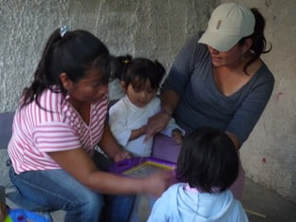Assessing Core Competencies: International Data on Child Development
Development of Measures
|
Our recent work draws attention to the need for new tools that will enable the collection of regionally comparable data across diverse cultural and socioeconomic countries in Latin America. We are partnering with the Inter-American Development Bank in Bolivia as part of the Programa Regional de Indicadores de Desarrollo Infantil (PRIDI), a project to develop and test the Engle Scale of Child Development across four countries in Latin America. Preliminary results from PRIDI's assessments of children between 24 and 59 months suggest that other common assessment tools may underestimate the knowledge and capabilities of children living in national minority populations. In collaboration with PRIDI, the Learning Lab is working to identify core competencies and to adapt assessments to better capture children's diverse skills and abilities.
|
Examination of Cognitive and Social-Emotional Development in Nicaragua
Globally, family wealth directly correlates with children's early life experiences, by way of the resources parents can invest into their development (e.g., education, health care, cognitive stimulation). Yet, little research in developing nations has directly explored the mechanisms beyond wealth that influence cognitive development such as the effect of early social context (i.e., parenting practices and accessibility to preschool education). Recent work from using the data from the PRIDI project indicate that wealthier children performed better than their poorer peers on cognitive measures. However, regression models show that children who experience high levels of structure across the wealth continuum, such that even in the lowest quartile of wealth, high structure removes any wealth effects of cognitive development.
Similarly, children who are enrolled in formalized preschool education programs exhibit higher cognitive skills ompared to their peers who are not enrolled in formalized preschool programs. These factors bear a statistically stronger impact than the socio-economic endowment of the home or maternal education levels for a child's cognitive development. High levels of structure in the home and high frequency of social interaction also seem to be particularly important for the social-emotional development, particularly for children reared in low-income families.
Results demonstrate that a child's proximal social environment (i.e., structure, social interaction, and preschool education) may be a more powerful factor than weath in facilitating children's cognitive and social-emotional potential. This suggests that the social-environment which is highly structured and provides ample opportunity for social interaction can act as a buffer from the negative effects of poverty. Therefore, the equity of outcomes for children with high structure, access to preschools, and high levels of social interaction signifies that supporting these variables may be central to reducing inequality in developmental potential in low and middle income countries.
Similarly, children who are enrolled in formalized preschool education programs exhibit higher cognitive skills ompared to their peers who are not enrolled in formalized preschool programs. These factors bear a statistically stronger impact than the socio-economic endowment of the home or maternal education levels for a child's cognitive development. High levels of structure in the home and high frequency of social interaction also seem to be particularly important for the social-emotional development, particularly for children reared in low-income families.
Results demonstrate that a child's proximal social environment (i.e., structure, social interaction, and preschool education) may be a more powerful factor than weath in facilitating children's cognitive and social-emotional potential. This suggests that the social-environment which is highly structured and provides ample opportunity for social interaction can act as a buffer from the negative effects of poverty. Therefore, the equity of outcomes for children with high structure, access to preschools, and high levels of social interaction signifies that supporting these variables may be central to reducing inequality in developmental potential in low and middle income countries.


